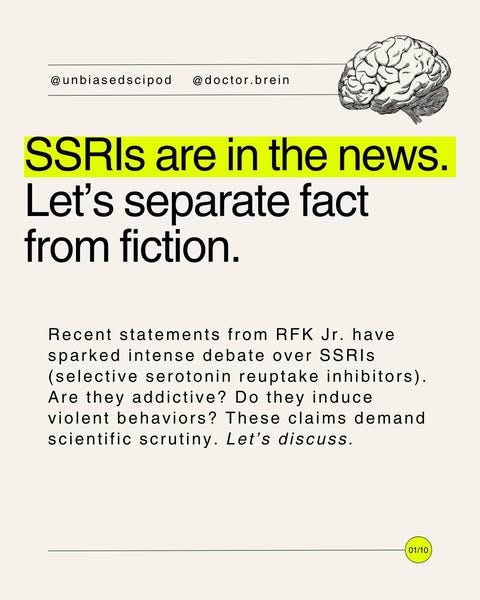Over the past few weeks, we have been inundated with questions about a new study that just came out evaluating the association between antidepressant use and cognitive decline in patients with dementia. The study was published on February 25th, 2025 in BMC Medicine and reported some rather alarming findings: namely, that the use of a specific antidepressant, SSRIs, is associated with a faster rate of cognitive decline in patients. But, FEAR NOT! Before you go flushing your Prozac down the toilet in the interest of preserving your memory, let’s discuss the considerable methodological flaws in this study…
In case you missed it, we recently had Dr. Ben Rein on the pod to discuss SSRIs— we discussed this paper as well as lots of other SSRI-related topics. Be sure to check it out!
Study Overview
To start off, this was a cohort study, a type of observational research in which a group of people (called a "cohort") who share a common characteristic or experience—here, dementia patients who use SSRIs—are followed over time to observe specific outcomes, namely cognitive decline. An important feature of cohort studies is their inability to definitively establish causality, unlike randomized controlled trials. This particular cohort study included 18,740 patients diagnosed with dementia between May 2007 and October 2018 in Sweden, followed for an average of 4.3 years. During follow-up, a total of 11,912 prescriptions for antidepressants were issued, with SSRIs being the most common (64.8%). Findings revealed that current antidepressant use was associated with a faster rate of cognitive decline, as measured by the Mini-Mental State Examination (MMSE), compared to nonusers (-0.30 points/year decline). The effect was apparently more pronounced among patients with severe dementia at baseline (initial MMSE scores 0-9, showing -1.51 points/year decline). Additionally, higher doses of SSRIs were associated with an increased risk of severe dementia (35% higher), bone fractures (25% higher), and all-cause mortality (18% higher).
Antidepressant and Cognitive Decline by Drug Type
The study found varying effects among different SSRIs, with escitalopram showing the strongest negative effect (-0.76 points/year), followed by citalopram (-0.41 points/year), and sertraline (-0.25 points/year). Mirtazapine (not an SSRI) also showed a modest negative effect (-0.19 points/year). Notably, when directly compared to sertraline, escitalopram was associated with significantly faster cognitive decline, while citalopram showed slower decline relative to sertraline.
Dementia and Depression
This study indicated that antidepressants were associated with faster decline in memory and cognitive function in individuals with dementia. However, it did not eliminate the possibility that the observed changes could be attributed to the presence of depression itself rather than the use of antidepressants. Nearly 80% of patients with Alzheimer’s disease, the most common type of dementia, experience depression during disease development and progression. In fact, depression that develops later in life may increase the risk of developing dementia by up to 20% in certain populations. Specifically, late-life depression is associated with increased levels of systemic inflammation, dysregulation of the hypothalamic pituitary-adrenal (HPA) axis, and elevated cortisol levels, all of which have been linked to neurodegeneration and brain atrophy. Moreover, depression-related changes in neurotransmitter systems, particularly reductions in serotonin, dopamine, and norepinephrine, can negatively impact cognitive function and accelerate neurodegeneration. While this study acknowledges that depression itself is associated with cognitive decline and dementia, the adjustment for this confounding factor may not have been sufficient. A sensitivity analysis excluding patients with depression was performed, but residual confounding remains a real possibility.
Study Design Issues
1. Confounding and Lack of Proper Controls
Comorbidities and Medication Use: While the study adjusts for various comorbidities using the Charlson Comorbidity Index (CCI) and medication use, the complexity of medication interactions, particularly between antidepressants and dementia treatments (e.g., cholinesterase inhibitors and memantine), could introduce residual confounding.
Disease Severity Bias: Patients with more severe dementia might be more likely to receive antidepressants, which could confound the association with cognitive decline.
2. Potential for Reverse Causality
The study treats antidepressant use as a time-varying exposure but does not fully address whether antidepressant use is a cause of cognitive decline or whether worsening cognitive function leads to increased antidepressant prescriptions. Patients with the lowest initial MMSE scores (0-9) exhibited the greatest subsequent cognitive decline (-1.51 points/year), suggesting that disease severity may be a key factor driving both medication use and outcome.
Patients experiencing cognitive decline may be more likely to develop neuropsychiatric symptoms such as depression and agitation, leading to increased antidepressant prescriptions. This could create a reverse causality bias where antidepressants are not causing cognitive decline but rather being used in response to it.
3. Clinical Significance
It's important to note that the magnitude of cognitive decline observed with antidepressant use (0.30 points/year overall) appears to be below what's typically considered clinically significant for MMSE scores (1-3 points). The study also found that subgroups differed in their response—men showed stronger negative effects than women, and the association was more pronounced in patients not using anxiolytics or hypnotics.
4. Measurement Issues
Use of MMSE as the Only Cognitive Measure: The Mini-Mental State Examination (MMSE) is a widely used tool, but it has limitations in detecting nuanced cognitive changes, especially in executive function and memory subdomains.
Lack of Adjustment for Baseline Cognitive Trajectories: The study adjusts for baseline MMSE scores, but individuals may have different pre-existing trajectories of cognitive decline that are not fully accounted for.
5. Selection Bias and Generalizability
Exclusion of Prior Antidepressant Users: The exclusion of individuals who used antidepressants before the study period introduces a selection bias. It may exclude those who were on long-term antidepressant therapy without experiencing cognitive decline.
Dropout and Survival Bias: The study mentions high attrition rates, which could skew results if patients who discontinued follow-ups had a different trajectory of cognitive decline compared to those who remained.
Population-Specific Findings: The cohort is from Sweden, and prescribing patterns, healthcare access, and dementia care models may differ from those in other countries, limiting generalizability.
6. Dose-Response Analysis and Classification Bias
Categorization of Antidepressant Dosage: The study uses the Defined Daily Dose (DDD) metric, which may not capture variations in individual patient responses to medication.
Class-Based vs. Drug-Specific Analysis: While SSRIs were analyzed as a class, there was notable heterogeneity in effects between different SSRIs (e.g., escitalopram had a stronger association with decline than sertraline). Pooling them together may obscure meaningful differences.
7. Lack of Randomization
The study is observational and lacks randomization, meaning it cannot establish causality.
Even with adjustments, residual confounding remains a major concern, as individuals prescribed antidepressants may differ systematically from those who are not in ways that are difficult to fully control.
Ultimately, while this study raises important questions about the potential effects of antidepressant use on cognitive decline in dementia patients, its findings should be interpreted with great caution. The study’s observational design inherently limits its ability to establish causality, and multiple methodological concerns – including confounding variables, potential for reverse causality, measurement limitations, and selection bias – highlight the need for further research before drawing firm conclusions. Depression itself is a well-documented risk factor for dementia, and its treatment remains a crucial component of dementia care.
Rather than discouraging the use of SSRIs and other antidepressants outright, future studies should focus on distinguishing the direct effects of these medications from the underlying impact of depression on neurodegeneration. Large-scale randomized controlled trials, combined with biomarker and neuroimaging studies, are necessary to provide more definitive answers regarding the risks and benefits of antidepressant use in this vulnerable population.
Until then, clinicians should contribute to take an individualized approach, carefully weighing the potential cognitive risks against the mental health benefits of antidepressant therapy in dementia patients.
Stay Curious,
Unbiased Science
P.S. Want to support this kind of analysis? The best way is to subscribe to our Substack and share our work. While all our articles are always completely free to read, paid subscriptions help sustain our in-depth reporting on vaccine policy and public health. Thank you for considering it!






I've been on Lexapro for several years now. I see no reason to think my mind is going to mush more quickly because of this. There's also the extreme way of looking at it like this. No SSRI at my current age could have led to self harm as bad as suicide. SSRI would at least help me live a life long enough to dementia, which would likely be decades. Based on that over-dramatic reasoning, I'll stick with the Lexapro.
I would love to see a similar detailed look at the evidence for dementia development in the setting of long-term benzodiazepine use. I might be wrong, but my feeling is also that it is not so straight forward, especially when you realise that dementia may affect sleep quality. So did the medicine cause the dementia, or did pre-clinical dementia lead to increased benzodiazepine use, say as a sleep aid?